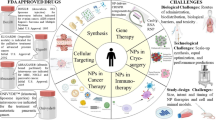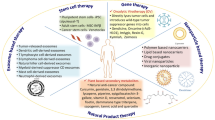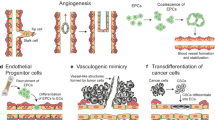Abstract
Background and aims
The angiogenesis inhibitor TNP-470 (AGM-1470) has shown encouraging results in animal models of established tumors. However, results of recent clinical trials using TNP-470 have been disappointing. Since little is known about the effects of TNP-470 at the minimal disease stage, we analyzed the effects of TNP-470 on the early stages of tumor establishment.
Methods
Twenty thousand green fluorescent protein (GFP)-transfected murine CT-26 (colonic carcinoma) or Panc-02-H0 (pancreatic adenocarcinoma) cells were inoculated in dorsal skin-fold chambers in BALB/c or C57BL6 mice. Tumor area and microvessel density (MVD) were quantified by intravital microscopy (IVM). Body weight was also monitored. Effects were compared with those in a conventional model involving subcutaneous (s.c.) inoculation of 106 tumor cells, followed by measurement of tumor volume, endogenous plasma VEGF/endostatin (ELISA) and proliferation/apoptosis/microvessel density (Ki-67/TUNEL/CD-34). TNP-470 was injected s.c. over the 10-day experimental period (30 mg/kg every 2 days [n=6] to 100 mg/kg/day [n=5 dorsal skin-fold chamber model, n=4 s.c. tumor model]).
Results
At 30 mg/kg/every second day neither CT-26 nor PANC-02-H0 tumors were inhibited in neither of the two models. TNP-470 dosage was escalated in CT-26-bearing animals until an antiangiogenic effect could be observed. In the IVM model, only TNP-470 100 mg/kg/day reduced MVD (P=0.006), but failed to block the onset of angiogenesis and tumor area increase. Body weight decreased by 25% (P<0.05). In the subcutaneous tumor model, tumor growth was reduced (P=0.045) but not blocked, while vascular endothelial growth factor (VEGF)/endostatin synthesis and Ki67/TUNEL/CD-34 were not significantly affected.
Conclusion
While capable of reducing tumor growth in a conventional model, treatment with TNP-470 does not block the onset of angiogenesis and tumor establishment in a model of minimal disease. When used as a single agent TNP-470 does not control minimal tumor disease in experimental colonic carcinoma.







Similar content being viewed by others
References
Folkman J (1995) Angiogenesis in cancer, vascular, rheumatoid and other diseases. Nat Med 1:27–31
Ingber D, Fujita T, Kishimoto S, Sudo K, Kanamaru T, Brem H, Folkman J (1990) Synthetic analogues of fumagillin that inhibit angiogenesis and suppress tumour growth. Nature 348:555–557
Beecken WD, Fernandez A, Joussen AM, Achilles EG, Flynn E, Lo KM, Gillies SD, Javaherian K, Folkman J, Shing Y (2001) Effect of antiangiogenic therapy on slowly growing, poorly vascularized tumors in mice. J Natl Cancer Inst 93:382–387
Inoue K, Chikazawa M, Fukata S, Yoshikawa C, Shuin T (2002) Frequent administration of angiogenesis inhibitor TNP-470 (AGM-1470) at an optimal biological dose inhibits tumor growth and metastasis of metastatic human transitional cell carcinoma in the urinary bladder. Clin Cancer Res 8:2389–2398
Hotz HG, Reber HA, Hotz B, Sanghavi PC, Yu T, Foitzik T, Buhr HJ, Hines OJ (2001) Angiogenesis inhibitor tnp-470 reduces human pancreatic cancer growth. J Gastrointest Surg 5:131–138
Bhargava P, Marshall JL, Rizvi N, Dahut W, Yoe J, Figuera M, Phipps K, Ong VS, Kato A, Hawkins MJ (1999) A phase I and pharmacokinetic study of TNP-470 administered weekly to patients with advanced cancer. Clin Cancer Res 5:1989–1995
Logothetis CJ, Wu KK, Finn LD, Daliani D, Figg W, Ghaddar H, Gutterman JU (2001) Phase I trial of the angiogenesis inhibitor TNP-470 for progressive androgen-independent prostate cancer. Clin Cancer Res 7:1198–1203
Stadler WM, Kuzel T, Shapiro C, Sosman J, Clark J, Vogelzang NJ (1999) Multi-institutional study of the angiogenesis inhibitor TNP-470 in metastatic renal carcinoma. J Clin Oncol 17:2541–2545
Drixler TA, Rinkes IH, Ritchie ED, van Vroonhoven TJ, Gebbink MF, Voest EE (2000) Continuous administration of angiostatin inhibits accelerated growth of colorectal liver metastases after partial hepatectomy. Cancer Res 60:1761–1765
Corbett TH, Roberts BJ, Leopold WR, Peckham JC, Wilkoff LJ, Griswold DP Jr, Schabel FM Jr (1984) Induction and chemotherapeutic response of two transplantable ductal adenocarcinomas of the pancreas in C57BL/6 mice. Cancer Res 44:717–726
Ogawa H, Sato Y, Kondo M, Takahashi N, Oshima T, Sasaki F, Une Y, Nishihira J, Todo S (2000) Combined treatment with TNP-470 and 5-fluorouracil effectively inhibits growth of murine colon cancer cells in vitro and liver metastasis in vivo. Oncol Rep 7:467–472
Asaishi K, Endrich B, Gotz A, Messmer K (1981) Quantitative analysis of microvascular structure and function in the amelanotic melanoma a-mel-3. Cancer Res 41:1898–1904
Carmeliet P, Jain RK (2000) Angiogenesis in cancer and other diseases. Nature 407:249–257
Guba M, Cernaianu G, Koehl G, Geissler EK, Jauch KW, Anthuber M, Falk W, Steinbauer M (2001) A primary tumor promotes dormancy of solitary tumor cells before inhibiting angiogenesis. Cancer Res 61:5575–5579
Kisker O, Becker CM, Prox D, Fannon M, D’Amato R, Flynn E, Fogler WE, Sim BK, Allred EN, Pirie-Shepherd SR, Folkman J (2001) Continuous administration of endostatin by intraperitoneally implanted osmotic pump improves the efficacy and potency of therapy in a mouse xenograft tumor model. Cancer Res 61:7669–7674
Weidner N, Semple JP, Welch WR, Folkman J (1991) Tumor angiogenesis and metastasis—correlation in invasive breast carcinoma. N Engl J Med 324:1–8
Li CY, Shan S, Huang Q, Braun RD, Lanzen J, Hu K, Lin P, Dewhirst MW (2000) Initial stages of tumor cell-induced angiogenesis: evaluation via skin window chambers in rodent models. J Natl Cancer Inst 92:143–147
Watson JC, Sutanto-Ward E, Osaku M, Weinstein JK, Babb JS, Sigurdson ER (1999) Importance of timing and length of administration of angiogenesis inhibitor TNP-470 in the treatment of K12/Trb colorectal hepatic metastases in bd-ix rats. Surgery 126:358–363
Bond SJ, Klein SA, Anderson GL, Wittliff JL (2000) Interaction of angiogenesis inhibitor TNP-470 with basic fibroblast growth factor receptors. J Surg Res 92:18–22
Holmgren L, O’Reilly MS, Folkman J (1995) Dormancy of micrometastases: balanced proliferation and apoptosis in the presence of angiogenesis suppression. Nat Med 1:149–153
Kato H, Ishikura H, Kawarada Y, Furuya M, Kondo S, Kato H, Yoshiki T (2001) Anti-angiogenic treatment for peritoneal dissemination of pancreas adenocarcinoma: a study using TNP-470. Jpn J Cancer Res 92:67–73
Shishido T, Yasoshima T, Denno R, Mukaiya M, Sato N, Hirata K (1998) Inhibition of liver metastasis of human pancreatic carcinoma by angiogenesis inhibitor TNP-470 in combination with cisplatin. Jpn J Cancer Res 89:963–969
Benson AB III, Mulcahy MF (2002) Recent and ongoing clinical trials for treating colorectal cancer. Expert Opin Investig Drugs 11:871–880
Tebbutt NC, Cattell E, Midgley R, Cunningham D, Kerr D (2002) Systemic treatment of colorectal cancer. Eur J Cancer 38:1000–1015
Van Cutsem E, Dicato M, Wils J, Cunningham D, Diaz-Rubio E, Glimelius B, Haller D, Johnston P, Kerr D, Koehne CH, Labianca R, Minsky B, Nordlinger B, Roth A, Rougier P, Schmoll HJ (2002) Adjuvant treatment of colorectal cancer (current expert opinion derived from the Third International Conference: Perspectives in Colorectal Cancer, Dublin, 2001). Eur J Cancer 38:1429–1436
Deans GT, Parks TG, Rowlands BJ, Spence RA (1992) Prognostic factors in colorectal cancer. Br J Surg 79:608–613
Lindemann F, Schlimok G, Dirschedl P, Witte J, Riethmuller G (1992) Prognostic significance of micrometastatic tumour cells in bone marrow of colorectal cancer patients. Lancet 340:685–689
Sanchez-Cespedes M, Esteller M, Hibi K, Cope FO, Westra WH, Piantadosi S, Herman JG, Jen J, Sidransky D (1999) Molecular detection of neoplastic cells in lymph nodes of metastatic colorectal cancer patients predicts recurrence. Clin Cancer Res 5:2450–2454
Acknowledgements
This work was funded in part by the Interdisciplinary Center for Clinical Research (IZKF) Grant no. 01KS9504N2 to Michael Cross. Cell sorting was performed in the Fluorescence Technology Unit of the IZKF.
Author information
Authors and Affiliations
Corresponding author
Rights and permissions
About this article
Cite this article
Cernaianu, G., Frank, S., Erbstößer, K. et al. TNP-470 fails to block the onset of angiogenesis and early tumor establishment in an intravital minimal disease model. Int J Colorectal Dis 21, 143–154 (2006). https://doi.org/10.1007/s00384-005-0751-4
Accepted:
Published:
Issue Date:
DOI: https://doi.org/10.1007/s00384-005-0751-4




